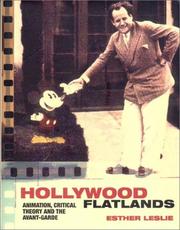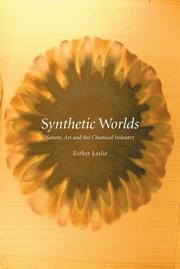| Listing 1 - 10 of 23 | << page >> |
Sort by
|

ISBN: 1859846122 Year: 2002 Publisher: London : Verso,
Abstract | Keywords | Export | Availability | Bookmark
 Loading...
Loading...Choose an application
- Reference Manager
- EndNote
- RefWorks (Direct export to RefWorks)
Animation (Cinematography) --- Animation (Cinematography). --- AVANT-GARDE (ESTHETIQUE) --- CINEMA --- ETATS-UNIS --- U.S.
Book
ISBN: 1282264842 9786612264849 1861895542 Year: 2005 Publisher: [London] : Reaktion,
Abstract | Keywords | Export | Availability | Bookmark
 Loading...
Loading...Choose an application
- Reference Manager
- EndNote
- RefWorks (Direct export to RefWorks)
This revealing study considers the remarkable alliance between chemistry and art from the late eighteenth century to the period immediately following the Second World War. Synthetic Worlds offers fascinating new insights into the place of the material object and the significance of the natural, the organic, and the inorganic in Western aesthetics.
Art and science. --- Chemical industry --- Nature (Aesthetics) --- Social aspects. --- Art and nature --- Nature and art --- Chemical industries --- Chemicals --- Man-made chemicals industry --- Synthetic chemicals industry --- Science and art --- Manufacture and industry --- Aesthetics --- Industries --- Science

ISBN: 9781844675043 1844675041 Year: 2002 Publisher: London Verso
Abstract | Keywords | Export | Availability | Bookmark
 Loading...
Loading...Choose an application
- Reference Manager
- EndNote
- RefWorks (Direct export to RefWorks)
film --- filmgeschiedenis --- animatie --- twintigste eeuw --- cultuurgeschiedenis --- populaire cultuur --- avant-garde --- Hollywood --- experimentele film --- abstractie --- Richter Hans --- Ruttman Walter --- Vertov Dziga --- Disney Walt --- Eisenstein Sergei --- Riefenstahl Leni --- Benjamin Walter --- Kracauer Siegfried --- 791.46 --- Film

ISBN: 1783719613 1849645248 058542599X 9780585425993 9781849645249 9780745315737 0745315739 9780745315683 0745315682 1783719621 9781783719617 0745315682 9780745315683 Year: 2000 Publisher: London : Pluto press,
Abstract | Keywords | Export | Availability | Bookmark
 Loading...
Loading...Choose an application
- Reference Manager
- EndNote
- RefWorks (Direct export to RefWorks)
Benjamin, Walter, --- Benjamin, W. --- Political and social views. --- Benjamin, Walter --- Holz, Detlef, --- Banyaming, --- Benʼyamin, Varutā, --- Peñcamin̲, Vālṭṭar, --- Binyamin, Ṿalṭer, --- בנימין, ולטר --- בנימין, ולטר, --- ולטר, בנימין, --- Penyamin, Palt'ŏ, --- 벤야민 발터, --- German prose literature --- Political scientists --- History and criticism.
Book
ISBN: 3031374320 3031374312 Year: 2023 Publisher: Cham : Springer Nature Switzerland : Imprint: Palgrave Macmillan,
Abstract | Keywords | Export | Availability | Bookmark
 Loading...
Loading...Choose an application
- Reference Manager
- EndNote
- RefWorks (Direct export to RefWorks)
This book provides a history of Imperial Chemical Industries (ICI), a large Britain- based chemical firm which was a major industrial player in the twentieth century. Once a model for Britain’s industrial reach and dominance, ICI collapsed in the mid-2000s, with some still profitable elements sold off to other chemical firms. The book focuses on the firm’s origin site in the Northeast of England, around Middlesbrough, engaging the remnants of the company magazine, oral histories and social media posts, and material artifacts in the world, to relate a history of the social, environmental, cultural and imaginative and bodily impact of the presence (and then absence) of ICI. This unique work is open to coincidence and speculation, drawing on science fictional and urban myth narratives which emanate from the area. Through the lens of global narratives of industrial and philosophical innovation, it inquires into uncommon and diverse themes, such as the manufacture of Quorn, the place of photographic mediation of the factory, and industrial disease. Setting out from a context of heavy industry and material processing, the book seeks to stimulate poetic and creative thinking around the ways in which people’s lives were enmeshed with synthetic chemicals and the dreams that seemed to ooze and seep from them as by-products. Esther Leslie is Professor of Political Aesthetics at Birkbeck, University of London in the UK, where she is Co-director of the Birkbeck Institute for the Humanities. She is a Fellow of the British Academy and accreddited as a Senior Fellow of the HEA.
Great Britain --- Labor. --- History. --- Human ecology --- Science --- Technology. --- Cities and towns --- History of Britain and Ireland. --- Labor History. --- Environmental History. --- History of Science. --- History of Technology. --- Urban History. --- Applied science --- Arts, Useful --- Science, Applied --- Useful arts --- Industrial arts --- Material culture --- Environmental history --- Labor and laboring classes --- Manpower --- Work --- Working class

ISBN: 1861892489 Year: 2005 Publisher: London : Reaktion,
Abstract | Keywords | Export | Availability | Bookmark
 Loading...
Loading...Choose an application
- Reference Manager
- EndNote
- RefWorks (Direct export to RefWorks)
Art and science. --- Chemical industry --- Nature (Aesthetics). --- Social aspects.

ISBN: 9781861893437 1861893434 Year: 2007 Publisher: London Reaktion
Abstract | Keywords | Export | Availability | Bookmark
 Loading...
Loading...Choose an application
- Reference Manager
- EndNote
- RefWorks (Direct export to RefWorks)
"Critic, essayist, translator, philosopher: Walter Benjamin maintains his position today as one of the twentieth century's most influential intellectuals. His work stimulates a profusion of responses in the form of novels, operas, films and artworks, as well as a never-abating production of academic texts. In this new biography, Esther Leslie uses the recently published entirety of Benjamin's correspondence as well as his numerous diaries and autobiographical Works in order to provide a meticulous and intimate account of his circumstances and thoughts. She sets his life in the context of his middle-class upbringing; explores the social, political and economic upheaval in Germany before and after World War One; and recounts Benjamin's eccentric love of toys, pop-up and lift-the-flap books, travel and ships. Seamlessly interweaving biographical details with an accessible yet concentrated account of Benjamin's intellectual development, Leslie draws a colourful portrait of a capacious intellect trapped in increasingly hostile circumstances." "Following Benjamin to Capri, Ibiza, Riga, Moscow, Paris and finally the Spanish border, where he dies while attempting to escape the Nazi occupation of France, Leslie challenges the populist depiction of the intellectual as a tragic and lonely figure, and restores the subject to his proper place as an artistic combatant and a relisher of experience."--Jacket.
Philosophers --- Benjamin, Walter --- Germany
Multi
ISBN: 9783031374326 9783031374319 9783031374333 3031374320 Year: 2023 Publisher: Cham : Springer Nature Switzerland : Imprint: Palgrave Macmillan,
Abstract | Keywords | Export | Availability | Bookmark
 Loading...
Loading...Choose an application
- Reference Manager
- EndNote
- RefWorks (Direct export to RefWorks)
This book provides a history of Imperial Chemical Industries (ICI), a large Britain- based chemical firm which was a major industrial player in the twentieth century. Once a model for Britain's industrial reach and dominance, ICI collapsed in the mid-2000s, with some still profitable elements sold off to other chemical firms. The book focuses on the firm's origin site in the Northeast of England, around Middlesbrough, engaging the remnants of the company magazine, oral histories and social media posts, and material artifacts in the world, to relate a history of the social, environmental, cultural and imaginative and bodily impact of the presence (and then absence) of ICI. This unique work is open to coincidence and speculation, drawing on science fictional and urban myth narratives which emanate from the area. Through the lens of global narratives of industrial and philosophical innovation, it inquires into uncommon and diverse themes, such as the manufacture of Quorn, the place of photographic mediation of the factory, and industrial disease. Setting out from a context of heavy industry and material processing, the book seeks to stimulate poetic and creative thinking around the ways in which people's lives were enmeshed with synthetic chemicals and the dreams that seemed to ooze and seep from them as by-products. Esther Leslie is Professor of Political Aesthetics at Birkbeck, University of London in the UK, where she is Co-director of the Birkbeck Institute for the Humanities. She is a Fellow of the British Academy and accreddited as a Senior Fellow of the HEA.
Pure sciences. Natural sciences (general) --- Pure sciences. Natural sciences --- Engineering sciences. Technology --- Applied sciences --- Regional documentation --- History --- History of the United Kingdom and Ireland --- History of Eastern Europe --- wetenschapsgeschiedenis --- wetenschap --- geschiedenis --- steden --- technologie --- Europese geschiedenis --- Great Britain --- Labor. --- History. --- Human ecology --- Science --- Technology. --- Cities and towns --- History of Britain and Ireland. --- Labor History. --- Environmental History. --- History of Science. --- History of Technology. --- Urban History.
Book
ISBN: 9781780235257 Year: 2016 Publisher: London Reaktion Books
Abstract | Keywords | Export | Availability | Bookmark
 Loading...
Loading...Choose an application
- Reference Manager
- EndNote
- RefWorks (Direct export to RefWorks)
77.01 --- fotografie --- fotografietheorie --- negentiende eeuw --- twintigste eeuw --- fotografiegeschiedenis --- 77.01 Fotografie--Semiotiek van de fotografie. Theorie --- Fotografie--Semiotiek van de fotografie. Theorie --- Aesthetics of art --- Photography --- photography [process] --- aesthetics
Periodical
Abstract | Keywords | Export | Availability | Bookmark
 Loading...
Loading...Choose an application
- Reference Manager
- EndNote
- RefWorks (Direct export to RefWorks)
| Listing 1 - 10 of 23 | << page >> |
Sort by
|

 Search
Search Feedback
Feedback About UniCat
About UniCat  Help
Help News
News